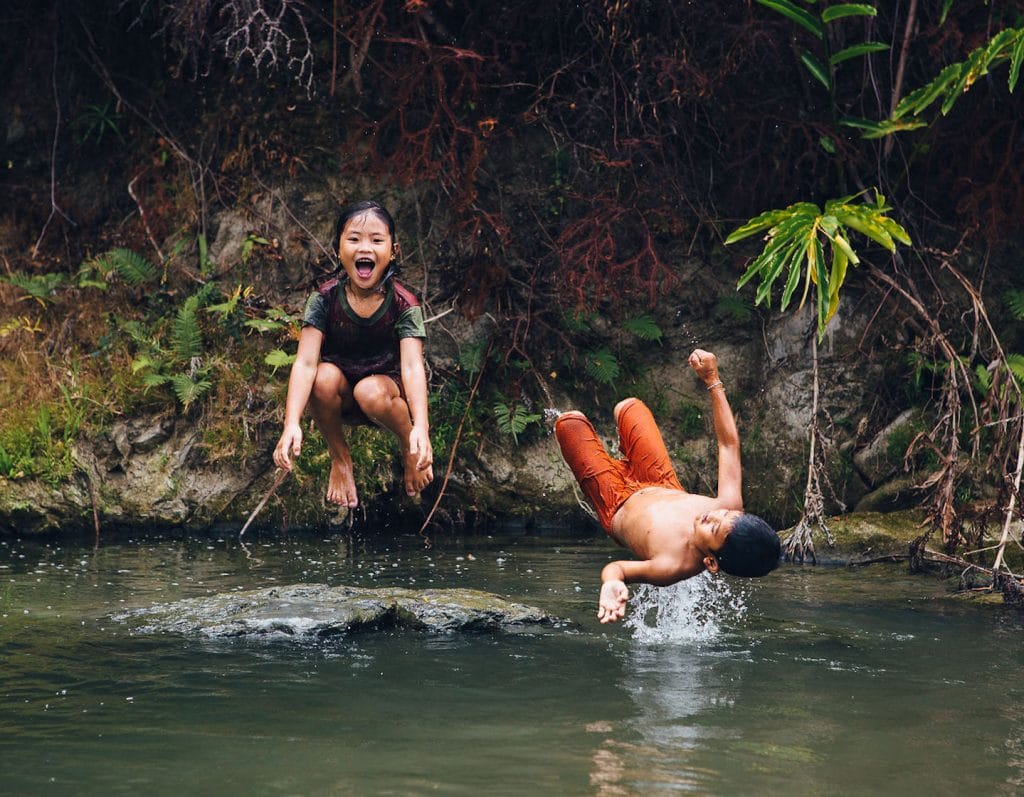
Interested in doing a charity trek to support an important cause? This mama shares her inspirational experience, and why more women need to get involved
A few months ago frequent Sassy Mama contributor Karien van Ditzhuijzen wrote about the organisation Women on a Mission and their upcoming trip to Sumatra in support of the Sakkudei Tribe in the Mentawai Islands of Sumatra in Indonesia. Karien and 10 other women did one of Women on a Mission’s charity walks to bring vital supplies to the Sakkudei, to highlight the importance of helping them preserve their way of life, and to encourage others to travel sustainably. From and unexpected funeral to dining on the delicacy of sago worms, read on for Karien’s powerful thoughts on this eye-opening experience….
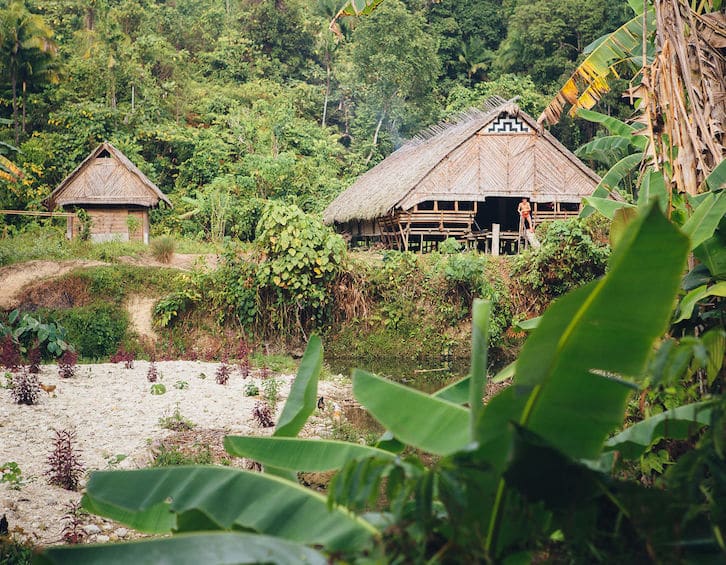
Imagine a place with no mobile network, no electricity, and no cash economy. A place where people only use what they find in the forest surrounding them and even then, ask permission from its soul before they take what they need. Participants of Women on a Mission’s latest charity trek expedition were fortunate enough to stay with the Sakkudei tribe at Siberut Island in Indonesia. It was real, raw and humbling to be there and experience a way of life so different from our own hectic ones. The sense of community the tribe demonstrates, and the way they live in harmony with nature, were an inspiration to us all.
Getting to the tribe is a journey in itself. Slowly, gradually, we felt ourselves moving away from the modern world. We flew to Padang, in West Sumatra, where we boarded a ferry to Muara Siberut, a small town on the south of the island. As soon as our boat left Padang, ‘civilisation’ (and with that I mean a mobile phone network) ended. At the jetty we met local guide Johan, and after a night in a guesthouse, we were ready to hit the jungle.
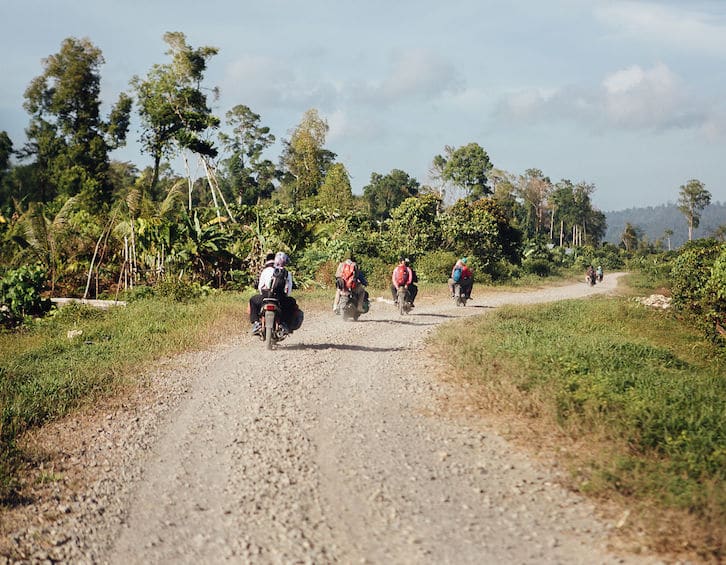
Unfortunately, because of an on-going drought, the water level in the river was too low for a canoe; instead, we traveled by motorbike. On the back of that bike, with the driver balancing my too big backpack uncomfortably between his knees, I felt the excitement build in my stomach with every bump, leap and shake. We were really on our way!
The last few hours we trekked on foot. Because of the drought, the swamp forests we walked through were dry – the mud we expected was instead a fine dust. We arrived at our home for the first night; our guide Aman Ipai’s uma in Buttui. Here we got our introduction to life in an uma, or community house – gently.
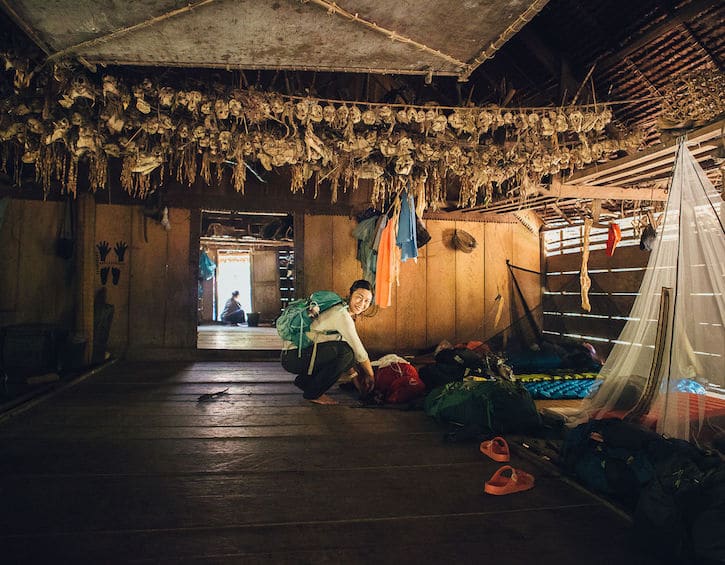
Just for us, eleven female visitors, Aman Ipai put in a brand new concrete step toilet! We slept in the middle of the open wooden house amongst animal skulls, and bathed in the river below. We helped the women prepare sago, caught fish in the river – although I’m inclined to say we were perhaps more of a burden than help. But being with the women, speaking with our hands and a little Bahasa Indonesia, shows us not many words are needed for humans from very different backgrounds to build a connection.
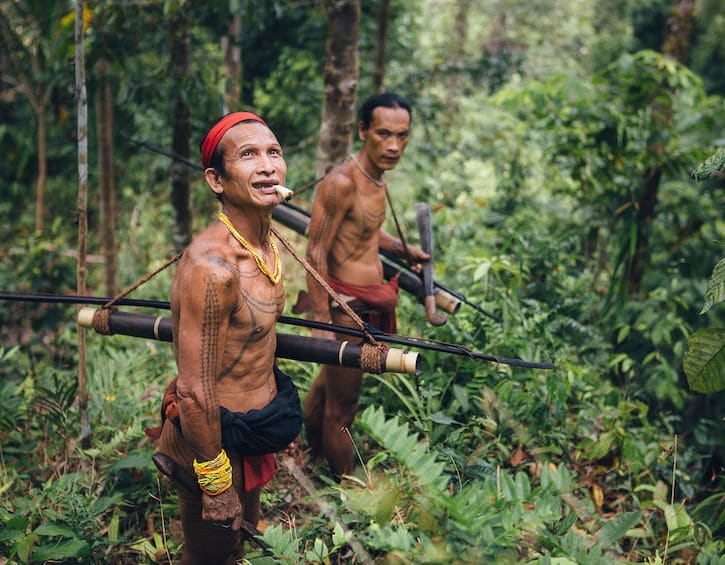
Aman Ipai is a newly appointed kerei (shaman) of the Sararakeit tribe, and we got to witness up close how spirituality is an integral part of the tribe’s daily life. Whenever two shamans meet – particularly when one is still an apprentice like Aman Ipai – they go through a ceremony to share their knowledge. The ceremony includes the offering of roosters, and talking and chanting deep into the night. Around the chanting shamans uma life goes on; women chat, children play, and eleven visiting women try to get some sleep.
Shortly after we arrived in Buttui, a delegation from our main destination – the uma in Attabai, arrived. They hiked though the jungle for several hours to deliver bad news: one of our host Teu Reppa’s sons – a father of eleven children – had unexpectedly passed away. They still want edus to come, but needed an extra day for the funeral arrangements. Soon enough the porters arrived to carry our bags up the long and difficult path to Attabai. Meeting my porter, a lady about half my height and more than my age, I stared at my big bag. I would end up giving away many of my possessions before going home, but a sense of embarrassment of the amount of stuff we modern women need, continued to creep up on me throughout the journey. Porter Monica shrugged, and after a hug and some adjustments to the straps on the pack, she set off happily enough.
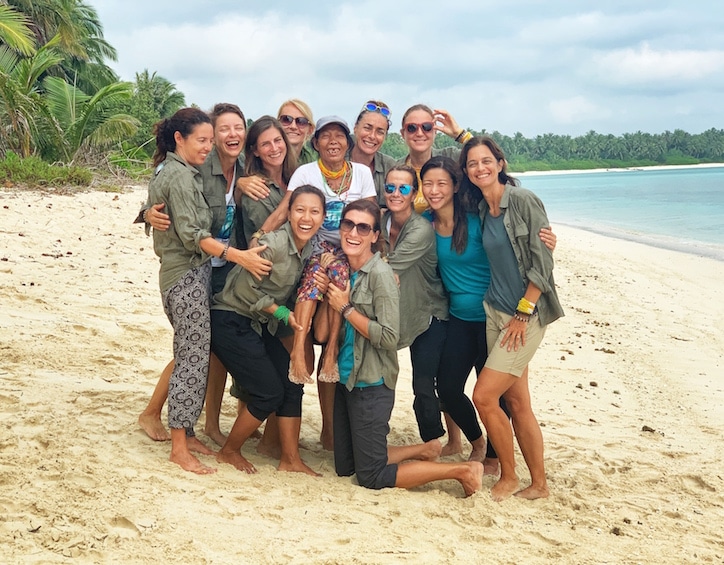
Buttui is close to a village and a rough motorcycle track, but Attabai can only be reached on foot; following Aman Ipai’s measured and steady steps we hiked through rivers, over a steep hill, and pathways that in more muddy conditions could only by crossed by wooden beams. When we arrived in Attabai, we were mindful of the mourning the family was in and kept our distance at our guides’ discretion. Grief among the Mentawai is expressed physically, with hugging and loud wailing. We felt awkward at first, but soon learned that for the tribe, these emotions have a natural place in life, and are not something to be hidden or feel embarrassed about.
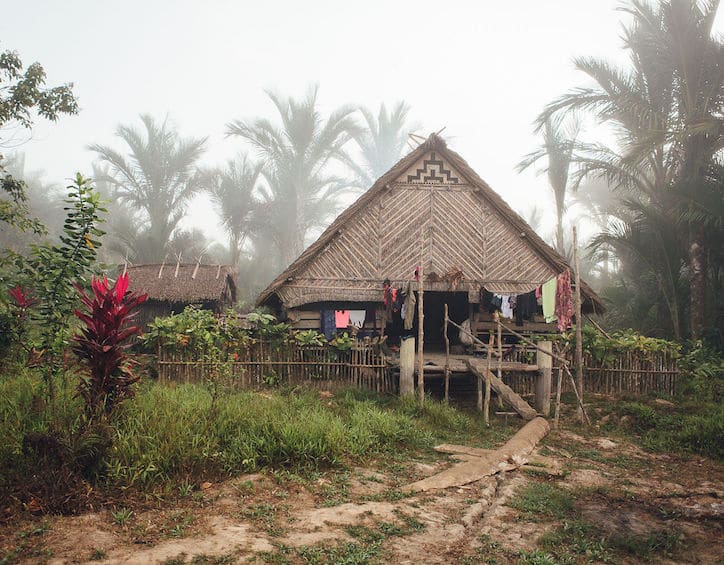
We explored our home for the week. Teu Reppa’s uma is further from the river, the wooden house standing in the middle of a dusty clearing. Pigs, cows and chicken roam around and under; the house is raised on stilts, you get up via a steep beam. There is no toilet, you go outside and the pigs clean up after. The house consists of a large wooden patio with benches all around, a middle section where we would sleep, and behind that, the kitchen.
In an uma, men and women sleep separately. Men stay on the patio; sexual relations are not allowed (which is why families also have smaller wooden huts in the forest – for privacy). The uma was decorated with skulls of deer, pigs and monkeys. Along the patio fly wooden birds, which Johan explained are toys for the souls. The Mentawai believe everything has a soul, and many of the ceremonies we witnessed were to give thanks to – or ask permission from – the soul of things they’d taken from the forest.
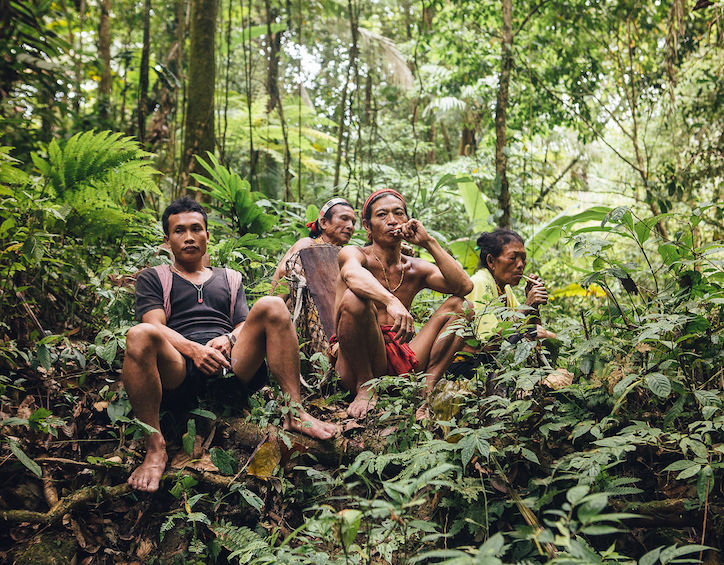
Our first night saw another shaman-knowledge-sharing event, as our host Teu Reppa is a chief shaman. As we began to nod off through their chanting, sudden screaming and stamping on the wooden floor jolted us back to alertness. The air in the uma crackled with suspense: dogs barked, cows mooed, pigs squealed and roosters crowed. We wouldn’t find out details until Johan enlightened us the next day: the soul of the recently deceased clan member had come back to inhabit others. One woman in a deep trance rocked and swayed, restrained by family members with a long piece of cloth. She came up to where we slept and danced at our feet, her beautiful voice filling the electric atmosphere. It continued all night; the chanting, the singing, the trances and the stampedes. We didn’t sleep much.
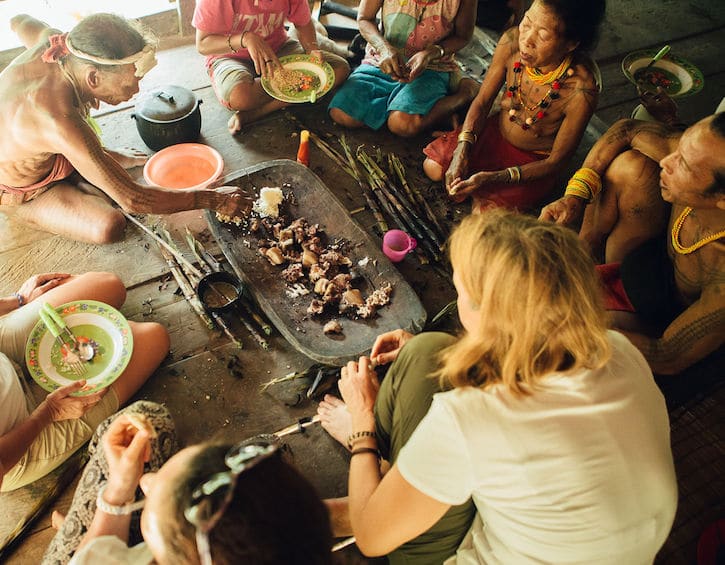
For a week we became part of the community and learned about the Mentawai’s way of life. We played with the children, went hunting with the men. We witnessed the ceremonial slaughter of pigs and share the meat with the tribe. We watched one of Teu Reppa’s sons chop up a rotten sago palm trunk, and saw the children swarm to it as if in a candy store. Here was a local delicacy we all had to try: sago worms. Their tough skin is rubbery, but the soft insides are creamy and sweet, like custard. The video of how much effort it took some of us to eat them is – in one word – hilarious.
Time and again we realized that not many words are needed for humans to bond, as we massaged the elderly, dispensed medicine, sang songs and strung beads with the children. The smiles and hugs at our goodbye said it all.
Now that we are back home, we hope to maintain some of our experience, and embrace a simpler way of living. One thing we definitely brought back is the love and care we received from our hosts, as well as a renewed conviction to protect the way of life of indigenous people like the Sakkudei and the rainforest they live in.
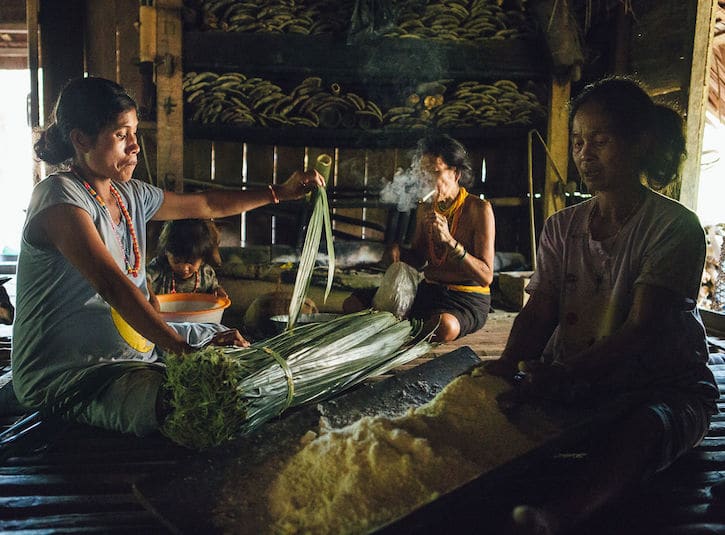
Clans like those of Aman Ipai and Teu Reppa occasionally receive visitors like ourselves, which helps them raise cash for items they need or to send children to school in the village. Tourism on Siberut Island is small-scale and usually respectful to the tribes – the last visitors Teu Reppa and his wife Goreng received came over a year ago. Eco-tourism has made the Indonesian government realise the economic importance of the forest and the people that live in it; about half of the island of Siberut is now a National Park and thus protected from loggers and palm oil corporations. Responsible tourism that focuses on empowering – rather than exploiting – the tribes can play an important role in preserving both their habitat and their culture.
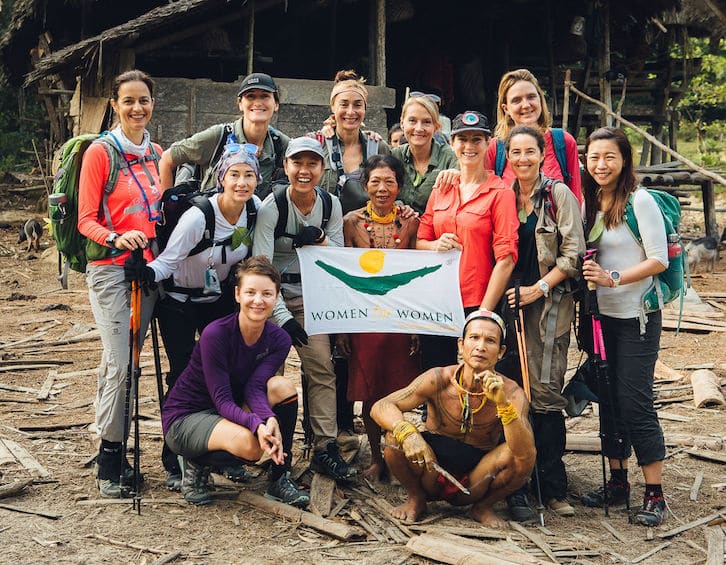
* Women on a Mission (WOAM) is a non-profit organisation, headquartered in Singapore, which aims to raise awareness and funds for women’s rights and empowerment, partnering with existing non-profit institutions that serve the underprivileged, with a particular focus on women’s issues. Every year they organise challenging expeditions – self-funded by each participant – to raise awareness and money for their chosen charities.
To learn more about Women on a Mission, or help them raise funds for women rebuilding their lives in war-torn zones, please visit the team’s fundraising page here. All donations will go directly to Women for Women International, and your generosity can truly change women’s lives.
www.womenmission.com
www.womenforwomen.org.uk
www.sukumentawai.org






 View All
View All




 View All
View All









 View All
View All




